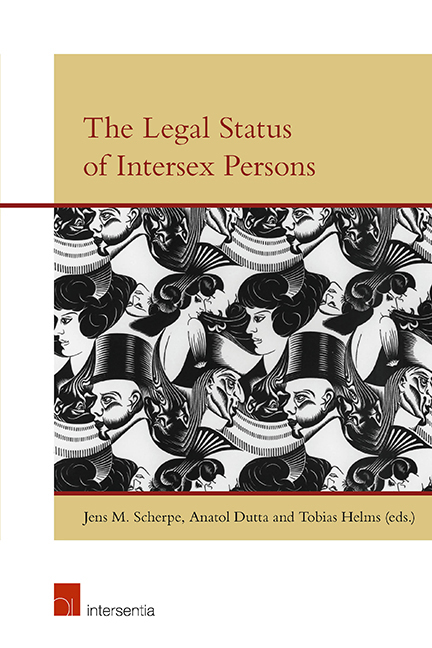Book contents
- Frontmatter
- Preface
- Contents
- List of Contributors
- The Legal Status of Intersex Persons: An Introduction
- Malta Declaration
- Darlington Statement
- Vienna Statement
- PART I MEDICINE AND PSYCHOLOGY
- Biology of Fetal Sex Development
- Intersex in the Brain: What Neuroscience can Tell the Law about Gender Identity
- Gender Identity and Intersex Conditions
- Evidence-Based Reviews of Medical Interventions Relative to the Gender Status of Children with Intersex Conditions and Differences of Sex Development
- PART II THEOLOGY AND LEGAL HISTORY
- PART III TRANSGENDER, TRANSSEXUALITY AND INTERSEX
- PART IV NATIONAL LEGAL DEVELOPMENTS
- PART V PRIVATE INTERNATIONAL LAW ASPECTS OF INTERSEX
- PART VI INTERSEX AND HUMAN RIGHTS
Evidence-Based Reviews of Medical Interventions Relative to the Gender Status of Children with Intersex Conditions and Differences of Sex Development
from PART I - MEDICINE AND PSYCHOLOGY
Published online by Cambridge University Press: 31 January 2019
- Frontmatter
- Preface
- Contents
- List of Contributors
- The Legal Status of Intersex Persons: An Introduction
- Malta Declaration
- Darlington Statement
- Vienna Statement
- PART I MEDICINE AND PSYCHOLOGY
- Biology of Fetal Sex Development
- Intersex in the Brain: What Neuroscience can Tell the Law about Gender Identity
- Gender Identity and Intersex Conditions
- Evidence-Based Reviews of Medical Interventions Relative to the Gender Status of Children with Intersex Conditions and Differences of Sex Development
- PART II THEOLOGY AND LEGAL HISTORY
- PART III TRANSGENDER, TRANSSEXUALITY AND INTERSEX
- PART IV NATIONAL LEGAL DEVELOPMENTS
- PART V PRIVATE INTERNATIONAL LAW ASPECTS OF INTERSEX
- PART VI INTERSEX AND HUMAN RIGHTS
Summary
INTRODUCTION
Twenty years ago, standard clinical practice regarding the treatment of infants with intersex conditions and differences of sex development reached a critical turning point, particularly on the question of what gender to assign the affected children and whether their gender assignments should be reinforced with surgical interventions. Prior to this period, prominent clinicians tended to minimise as anomalous the statements of aggrieved adults whose bodies had been surgically modified in childhood and who suffered physical pain, genital dysfunction, loss of fertility, and sexual sensitivity, as well as those who considered the interventions a violation of their identity and personal integrity. By 1997, however, case studies had been published confirming rejections of gender assignments by older minors and adults who had been subjected to medical gender-conforming procedures in childhood. These disclosures led to the first reform guidelines proposing that while a social gender assignment for infants could be expected to continue, clinical practice should be more open to recognition of diverse gender identities and resistant to surgical interventions designed to reinforce an assigned gender. On the whole, however, clinical practitioners did not appear to embrace these guidelines. Rather, while the calls for practice changes were expected to ‘accelerate the re-examination of the clinical care of the intersex patient’, they instead marked the start of a period of a ‘crisis in clinical management’, one in which many clinicians found it difficult to change their practices without scientific evidence conclusively proving that all gender-conforming medical interventions are too risk-laden or unnecessary to support gender assignment on infants and young children.
Concerned about the quality of evidence supporting clinical practice, a group of prominent expert-clinicians organised several invitational gatherings of their colleagues to review gender-assignment practices and the medical interventions used to reinforce them. The first of these gatherings took place in Chicago in 2005 and was dubbed the Chicago Consensus, which led to the publication of a Consensus Statement the following year. This Consensus Statement recommended caution for a limited number of interventions but acknowledged that the lack of long-term outcome data was a ‘major shortfall’ of clinical practice, including gender assignment in infancy.
- Type
- Chapter
- Information
- The Legal Status of Intersex Persons , pp. 81 - 102Publisher: IntersentiaPrint publication year: 2018



